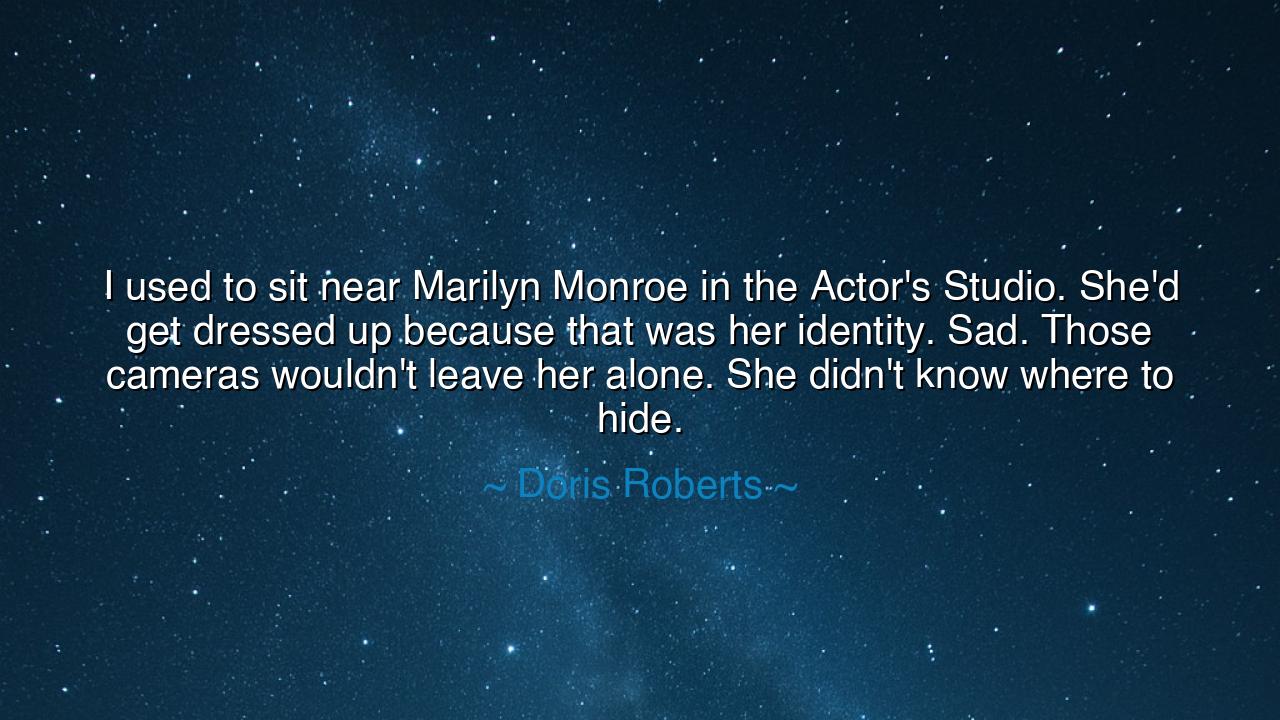
I used to sit near Marilyn Monroe in the Actor's Studio. She'd
I used to sit near Marilyn Monroe in the Actor's Studio. She'd get dressed up because that was her identity. Sad. Those cameras wouldn't leave her alone. She didn't know where to hide.






“I used to sit near Marilyn Monroe in the Actor’s Studio. She’d get dressed up because that was her identity. Sad. Those cameras wouldn’t leave her alone. She didn’t know where to hide.” — thus spoke Doris Roberts, the seasoned actress whose long life on the stage and screen gave her the vision to see not only fame, but the loneliness that shadows it. Her words are heavy with compassion, for in them lies the story of a woman torn between who she was and who the world demanded her to be. Roberts, in speaking of Marilyn Monroe, does not gossip—she mourns. Her tone is not one of judgment, but of recognition, for she saw in Marilyn a tragedy as old as humanity: the loss of the self behind the mask of adoration.
Marilyn Monroe, born Norma Jeane Mortenson, became the embodiment of desire and glamour in the mid-twentieth century. Yet behind that golden smile burned a heart caught between light and shadow. The Actor’s Studio, where Roberts saw her, was a sanctuary for artists seeking truth. There, actors stripped away pretenses to touch the raw pulse of human emotion. But even in that sacred space, Marilyn could not shed the armor of her public identity. As Roberts recalls, “she’d get dressed up because that was her identity.” The words ring with sorrow—for Marilyn had become a prisoner of her own reflection. Her beauty, her fame, her allure—these were not gifts, but chains.
“Those cameras wouldn’t leave her alone.” What Roberts saw was not the worship of fame, but its cruelty. The camera—symbol of the modern gaze—followed Marilyn as relentlessly as fate itself. It devoured her privacy, her vulnerability, her peace. Wherever she went, the lenses waited, hungry for the next image, the next story, the next fracture in the illusion. The ancient philosophers spoke of the danger of living for appearances; Marilyn’s life was the modern proof of their warning. She was adored by millions, yet unseen by most. The more the world looked at her, the less it truly saw her.
And then comes the final, most haunting line: “She didn’t know where to hide.” These words pierce like prophecy. They reveal the deepest tragedy—not that Marilyn was famous, but that she could find no refuge from the role that fame demanded. Every human being seeks a place of rest, a corner of the soul where they can be simply themselves. But for Marilyn, even solitude was haunted by the echo of her image. She was both everywhere and nowhere, known by all but understood by none. In this, her story becomes the story of all who lose themselves in the pursuit of what the world calls success.
Consider, too, the fate of Emperor Nero, who ruled Rome in splendor yet was consumed by the spectacle of his own image. He demanded admiration, built monuments to his glory, and surrounded himself with performance. Yet in the end, when the applause faded, he stood alone, whispering, “What an artist dies in me.” Like Marilyn, he could not escape the illusion he had created. Fame, when sought for its own sake, becomes a flame that burns the one who bears it. Doris Roberts’ remembrance of Marilyn is not merely about Hollywood—it is about the eternal struggle between authenticity and illusion, between being and appearing.
From these words arises a lesson both tender and profound. One must learn to guard the inner self from the world’s unending hunger for spectacle. To live truthfully is to know when to step away from the cameras, whether they be real or metaphorical—the judgments, expectations, and performances demanded by others. The soul needs privacy as much as the body needs breath. True peace is not found in the gaze of others but in the quiet acceptance of one’s own being.
Lesson: Do not build your identity from what others see; build it from what is real within you. Be wary of the world’s applause, for it can drown the still, small voice of truth. Seek instead the company of those who see your heart, not your reflection. Remember Marilyn Monroe—not for her beauty, but for her longing to be free of it. And remember Doris Roberts, whose wisdom shines like a quiet flame amid the glitter of fame. She teaches us that to be known by all and understood by none is the loneliest fate of all. Choose instead the path of authenticity—where you may walk unseen, but never alone within yourself.






AAdministratorAdministrator
Welcome, honored guests. Please leave a comment, we will respond soon